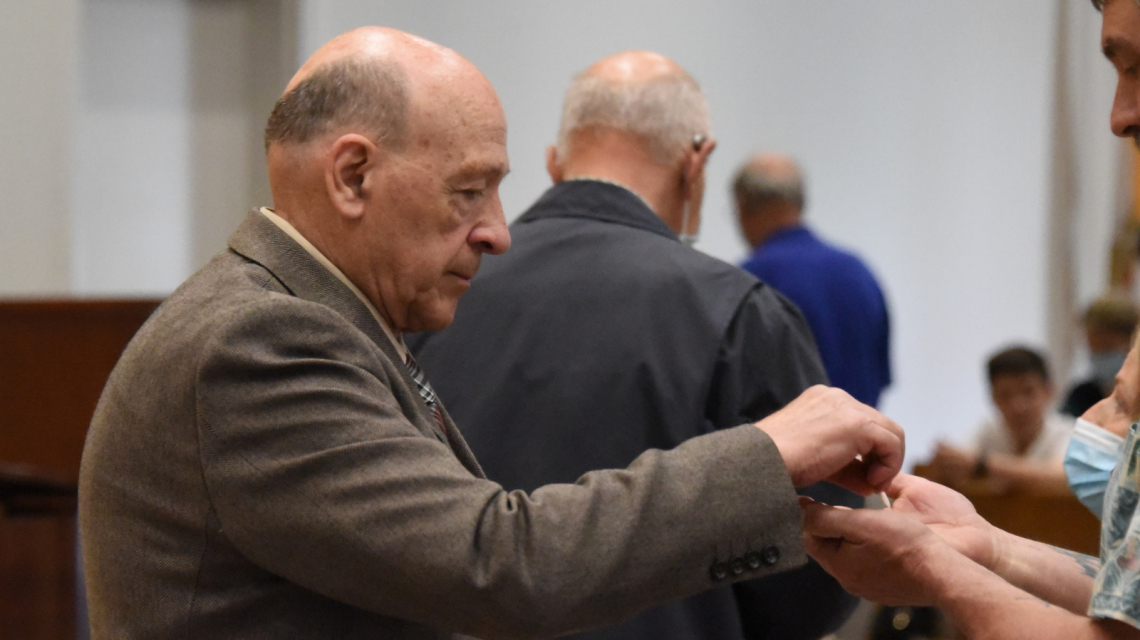Eucharist Received

The Eucharist received focuses on individual preparation for personal encounters with Jesus Christ in the Mass, especially ongoing conversion to ever greater faith and devotion through sharing in holy Communion.
To receive Communion is to receive Christ himself, who is present under the appearance of bread and wine. What looks and tastes like bread and wine is no longer bread and wine once Christ’s own words transform them into the sign or sacrament of his personal real presence. Christ wills to become present during the celebration of Mass, as he once promised, so that he can be personally and bodily present to those who never looked upon him or heard his voice when he was on earth. The manner of being present is different, but his presence now is the same as it was then.
Why is it important to receive Communion?
"The principal fruit of receiving the Eucharist in Holy Communion is an intimate union with Christ Jesus. Indeed, the Lord said: 'He who eats my flesh and drinks my blood abides in me, and I in him' (CCC 1391).
Christ comes to believers in order to share his life with them and to be united with them. That is the purpose of our receiving the Eucharist in Holy Communion. We are able to be intimately united with Christ. Normally, the food we take is transformed into our flesh and blood. But this spiritual food and drink that we take is meant to transform us into the One who is being received. Holy Communion "preserves, increases, and renews the life of grace received at baptism" (CCC 1392). We are meant to grow more and more like Christ by receiving the Eucharist in Holy Communion.
Our reception of Holy Communion should help us grow in charity for others, too, since the Eucharist is the sign of the great love Jesus had for us, so much so that he gave up his life for us. This is also a reality that is often underappreciated at our celebration of Mass.
What do I need to do to be ready to receive Communion?
Catholics are encouraged to receive Communion every time they attend Mass. In order to be properly disposed to receive Communion, participants should not be conscious of having committed a grave sin. If they are, they should first participate in the sacrament of reconciliation. (There is an exception in grave situations when there is no opportunity for confession. In those cases, the person should make an act of perfect contrition.)
Before receiving Communion, a person should also have fasted for at least one hour.
It is important to receive Communion with the proper reverence. The communicant should slightly bow his or her head before receiving the Eucharist, which may be received either on the tongue or in the hand, whichever the communicant chooses. If receiving in the hand and you are right handed, your left hand should rest upon the right (and vice versa if you are left handed). The host will be placed in the palm of your hand, with the words, "The Body of Christ," to which you should reply, "Amen." Your hands should be clean before receiving the host.
Can I receive Communion if I have not attended Mass for a while?
We should start with the assumption that you have received formation and have received the sacraments of penance and Eucharist (holy Communion). If not, then sacramental preparation would be needed prior to receiving those sacraments. Being away from the practice of your Catholic faith would normally mean that to return to the Communion table one would have to go to confession first. In any event, attending Mass and participating in any of the other rich fare offered by the Church is highly recommended. In many cases, a valid confession would be the only step necessary to begin receiving holy Communion again. The best advice would be to contact your parish office to schedule an appointment with a priest to discuss your specific situation.
Resources
- "Do this in memory of me." - Bishop Deeley's pastoral letter
- Returning to Mass FAQs
- Understanding the Mass
- Harvest magazine - Dear Fr. Joe: Is Christ really and truly present in the Eucharist?
- Harvest magazine - The Last Word - Hungry for Bread, Hungry for the Eucharist (March 2022)
- Bishop Robert Barron: The Real Presence of Christ in the Eucharist
- Pope Francis: The Power of the Eucharist









